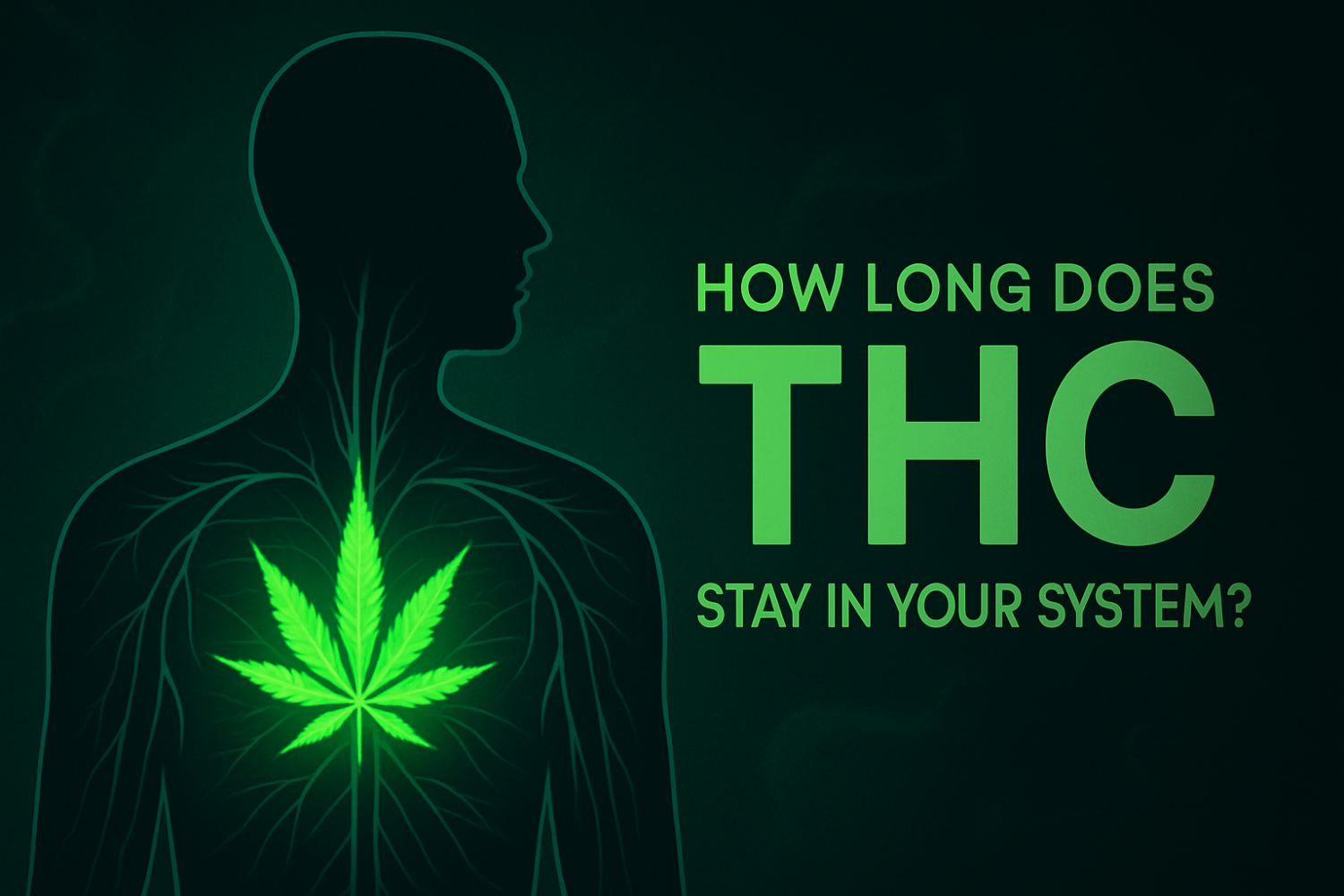Cannabis consumption is more mainstream than ever, but one of the biggest questions people still ask is: how long does THC stay in your system? The answer isn’t one-size-fits-all. It depends on factors like metabolism, body fat percentage, frequency of use, and the type of drug test you’re facing.
If you’re wondering how long does THC stay in your system because of employment, sports, legal situations, or just curiosity, understanding THC’s lifespan in the body is critical. Knowing how THC is metabolized and how long it lingers in your blood, urine, saliva, or hair can help you make smarter, more informed decisions.
How Long Does THC Stay In Your System?
THC And The Human Body
THC (tetrahydrocannabinol) is the primary psychoactive compound in cannabis. When consumed—whether smoked, vaped, or eaten—it travels through the bloodstream and binds to receptors in the brain and body.
When thinking about how long does THC stay in your system, the “high” from cannabis only lasts a few hours because that’s how long active THC is in your bloodstream and affecting your brain. But once your body starts breaking THC down, it leaves behind chemical leftovers called metabolites—the main one is called THC-COOH.
These metabolites don’t make you feel high, but they stay stored in your fat cells and organs for days, weeks, or even months. Since drug tests aren’t looking for whether you’re high in the moment, they check for these leftover metabolites. That’s why you can feel completely sober but still test positive long after your last smoke session.
Because THC is fat-soluble, it stores in fat cells and is released slowly over time. That’s why heavy users often test positive much longer than occasional consumers.
The answer to the question how long does THC stay in your system is simple, it is different for everyone.
THC Detection Times By Test Type
Different tests detect THC for different lengths of time.
Here’s the breakdown:
Urine Tests
The most common form of drug testing. THC-COOH metabolites are detectable for:
- Occasional Users (1–2 times a week): Up to 3–7 days
- Moderate Users (3–4 times a week): 7–14 days
- Frequent Users (daily): 15–30 days
- Heavy/Chronic Users: 30–90+ days
Blood Tests
THC is only detectable in blood for a short window.
- Single Use: 1–2 days
- Regular Use: Up to 7 days
Saliva Tests
Often used for roadside checks.
- Occasional Users: 24–72 hours
- Frequent Users: Up to 1 week
Hair Follicle Tests
The most invasive and longest detection window.
- THC can show up for up to 90 days in hair samples.
Factors That Influence How Long THC Stays in Your System
- Frequency of Use: The more often you consume, the longer it stays.
- Body Fat Percentage: Higher body fat = longer detection times.
- Metabolism: Faster metabolisms process THC quicker.
- Consumption Method: Edibles can last longer in your system than smoking.
- Potency of Product: Higher THC percentages extend detection.
- Hydration and Lifestyle: Exercise, diet, and water intake affect metabolite release.
How To Potentially Shorten Detection Time for THC
While there’s no magic solution, there are some strategies that may help your body process THC more efficiently:
- Hydrate: Drinking water helps flush metabolites, though overhydration won’t erase THC instantly.
- Exercise: Burns fat cells where THC is stored. Be careful—working out right before a test can actually spike THC levels temporarily.
- Healthy Diet: Fiber helps process waste; antioxidant-rich foods support liver function.
- Time: Ultimately, only time guarantees a clean system.
Why THC Lasts Longer For Some People
Two people could smoke the same joint, but one might test clean in a week while the other still shows positive after a month. Genetics, liver enzyme efficiency, lifestyle habits, and even gender can all play a role.
Women generally retain THC longer due to higher average body fat percentage.
Transition Into Testing Realities
Drug tests don’t just measure whether you’re currently high—they measure past consumption. That’s why someone can test positive even if they haven’t consumed in days or weeks.
Employers, athletic organizations, and legal entities use these detection windows, not intoxication levels, which often creates controversy around fairness.
FAQ: How Long Does THC Stay In Your System?
1. How long does THC stay in your system for occasional users?
Around 3–7 days.
2. Can one hit of weed show up on a drug test?
Yes, even a single use can test positive for 1–3 days.
3. How long does THC stay in your system if you smoke every day?
Anywhere from 15–30 days, sometimes longer.
4. Can edibles be detected longer than smoking?
Yes, edibles take longer to metabolize and can stay detectable slightly longer.
5. How long does THC stay in your system? How long does THC stay in your bood?
Usually 1–2 days for occasional use, up to 7 days for daily use.
6. What about saliva tests? How long does THC stay in your system via saliva?
1–3 days for light use, up to a week for heavy use.
7. Can THC be detected in sweat?
Yes, though sweat patch tests are less common and detect over days to weeks.
8. How long does THC stay in hair?
Up to 90 days.
9. Do detox drinks work?
Some may help dilute urine, but they don’t erase THC metabolites.
10. Will exercising before a test help?
Not always; it can release THC from fat cells and increase metabolites temporarily.
11. Can secondhand smoke cause a positive test?
Highly unlikely in most cases, unless exposure is extreme in a closed space.
12. Do CBD products show up as THC?
Full-spectrum CBD can contain trace THC, which may trigger a positive test.
13. How long does delta-8 THC stay in your system?
Similar to delta-9 THC, since it metabolizes the same way.
14. Can drinking cranberry juice or tea detox THC?
Not reliably—hydration helps, but it doesn’t guarantee a clean test.
15. Does body weight affect THC detection?
Yes, higher fat storage equals longer detection.
16. How long does THC from vapes stay in your system?
Roughly the same as smoking flower—days to weeks depending on usage.
17. Can prescription meds affect THC metabolism?
Yes, certain drugs can slow liver enzyme activity, prolonging THC presence.
18. Do different strains change how long THC lasts?
Not significantly—the main factor is THC percentage, not strain.
19. How long does THC stay in teenagers compared to adults?
Metabolism is faster in younger people, but lifestyle factors vary.
20. What’s the fastest way to get THC out of your system?
Time, hydration, and exercise—there’s no instant fix.
THC doesn’t leave everyone’s body at the same speed. Detection windows vary depending on consumption habits, biology, and the type of test. For light users, THC may clear in days, while for heavy users, it can take weeks or months.
If you’re preparing for a test or just curious about your own body, the key takeaway is this: THC stays in your system much longer than the high lasts. Even low THC strains will still show in your system.
Respect your limits, understand the science, and make choices with the right knowledge in mind.







